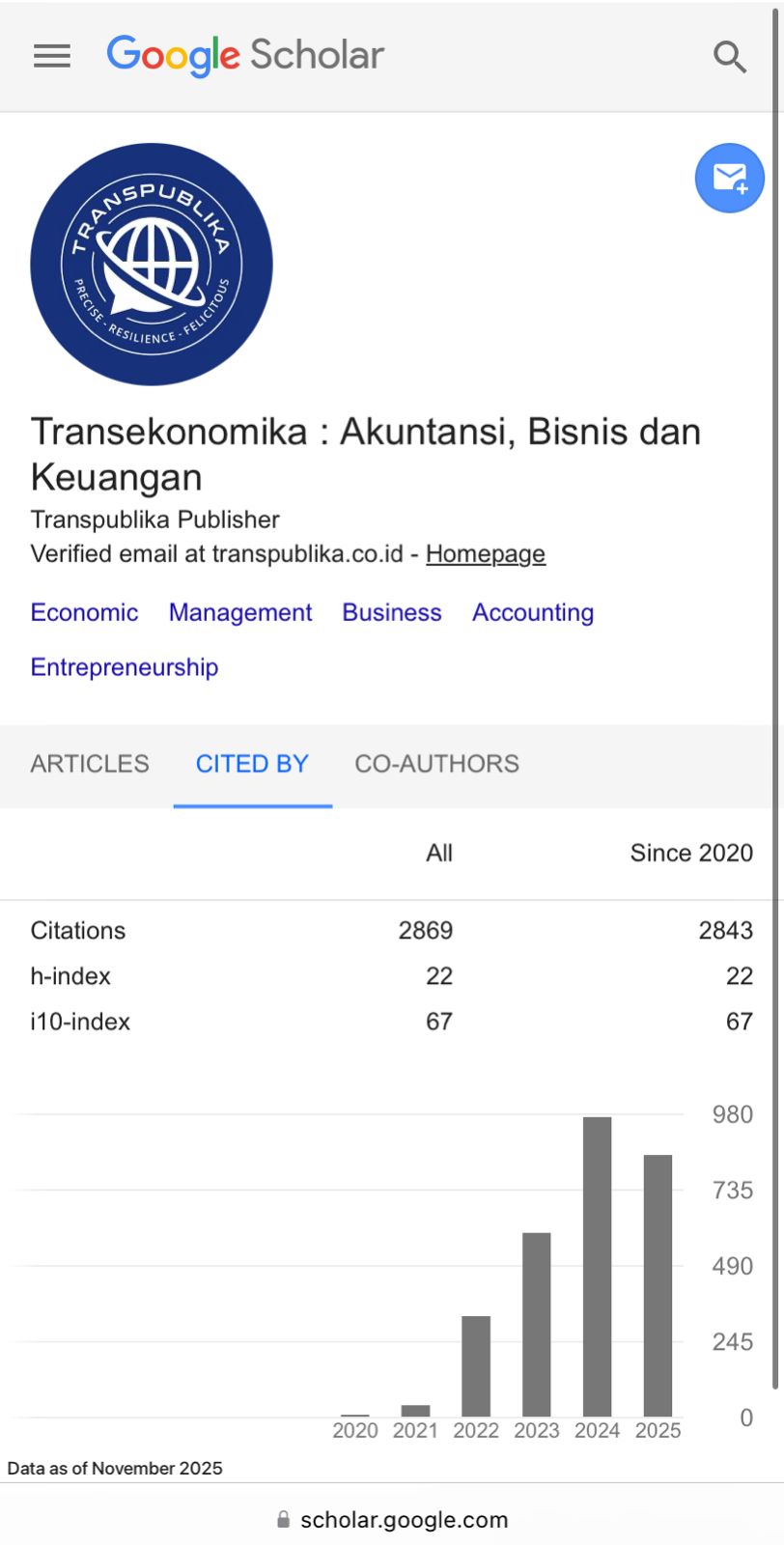IMPLIKASI PSAK 68 AKIBAT DAMPAK COVID-19 TERHADAP PERUSAHAAN SEKTOR PERBANKAN DI INDONESIA
DOI:
https://doi.org/10.55047/transekonomika.v2i5.165Keywords:
PSAK 68, Fair Value, BankingAbstract
The global Covid-19 outbreak coincided with the release of financial accounts in 2019. Fair value was one of the consequences. The price that would be obtained to transfer an asset or liability in an orderly transaction between market players, as defined by PSAK 68, is fair value. The goal of this research is to find out which companies have a direct impact on PSAK 68 and how companies generate financial reports in line with the Covid-19 situation. This method of research employs qualitative research methods. This type of qualitative research is descriptive in nature and tends to utilize analysis. In this study, document studies are used to examine the financial statements of banking organizations in Indonesia in 2020. According to the findings of this study, PSAK 68 is used in the financial statements of 11 out of 33 banking companies. The Covid-19 pandemic's uncertainty has a significant impact on the disclosure of assessments and inputs, as well as the sensitivity of the assessment to changes in businesses while compiling financial statements.
Downloads
References
Astuti, E. B., & Retnoningsih, S. (2020). Implikasi PSAK 68 Pada Pelaporan Keuangan Covid 19. Webinar Dan Call for Paper Online.
Astuti, E., & Sulistyowati, N. W. (2017). Adaptasi Fair Value Accounting Untuk Instrumen Keuangan: Analisis Kualitatif Konvergensi IFRS Perusahaan Perbankan. Prosiding Seminar Nasional Hasil Penelitian LPPM Universitas PGRI Madiun, 62–69.
Epstein, B. J., & Jermakowicz, E. K. (2010). WILEY Interpretation and Application of International Financial Reporting Standards 2010. John Wiley & Sons.
Fithriyyah, N. (2018). Estimasi Penilaian Revaluasi Aset Tetap sebagai Pendukung Keputusan Penerapan Tax Planning pada PT. Harapan Sejahtera Karya Utama [Doctoral dissertation]. Universitas Islam Negeri Maulana Malik Ibrahim.
IAI. (2018). PSAK 68 Pengukuran Nilai Wajar. Standar Akuntansi Keuangan. https://docplayer.info/32754276-Ed-psak-68-exposure-draft.html
IAI. (2020). Dampak Pandemi Covid-19 Terhadap Penerapan PSAK 68 Pengukuran Nilai Wajar. Press Release.
Kementerian Keuangan. (2021). Merekam Pandemi Covid-19 dan Memahami Kerja Keras Pengawal APBN. Kementerian Keuangan Republik Indonesia.
Moleong, L. J. (2010). Metodologi Penelitian Kualitatif. Rosda Karya.
Murti, N. W., & Darma, A. B. (2018). Kecenderungan emiten untuk memilih menyajikan laporan keuangan berdasarkan nilai wajar setelah penerapan PSAK 68. Bilancia: Jurnal Ilmiah Akuntansi, 2(4), 388–396.
Murti, N. W., & Suyanto, S. (2017). The relevance of fair value concept compared to historical costs in Indonesia. Proceedings Of Indonesia Focus, 1(1).
Pardede, S. M. D. (2016). Financial policies and timeliness of financial reporting by Indonesian listed firms (Doctoral dissertation, Deakin University). [Doctoral dissertation]. Deakin University.
Prasetyo, A. A. (2022). Meminimalisir Asimetri Informasi Melalui Pelaporan (Disclosure) Laporan Keuangan. Transekonomika: Akuntansi, Bisnis Dan Keuangan, 2(1), 45–54. https://doi.org/https://doi.org/10.55047/transekonomika.v2i1.104
Sukendar, H. (2012). Konsep Nilai Wajar (Fair Value) dalam Standar Akuntansi Berbasis IFRS di Indonesia Apa dan Bagaimana? Binus Business Review, 3(1), 93–106.
Wilestari, M., & Afriani, W. (2019). Penerapan Nilai Wajar Untuk Penilaian Aset Perusahaan Perbankan Pada Bank Permata, Tbk. Akrual, 1(1), 1–14.








.png)







.png)


.png)

.png)












